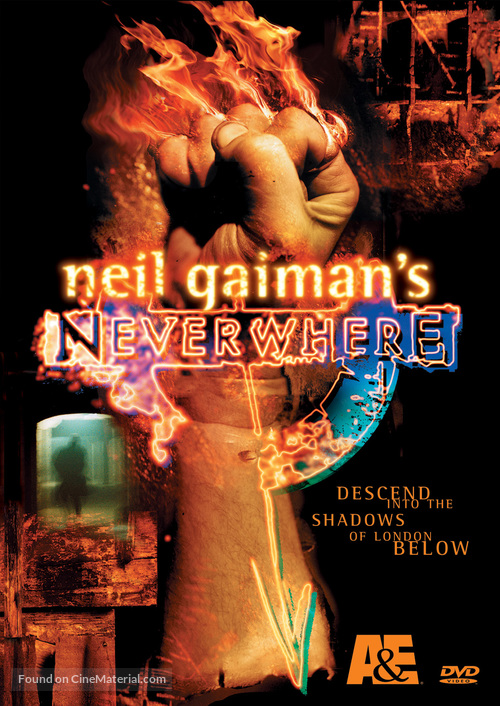I vaguely remember seeing an episode of Neverwhere when it was first shown on the BBC back in the mid-1990s. The unusual yet pretty face of Laura Fraser, with her big eyes and scruffy clothes, are all I can remember of the show – there wasn’t much in that episode that made me decide to keep watching. I was aware of Neil Gaiman by then, which is why I was watching the programme in the first place. Only, it was rather shoddy and a little embarrassing, so I didn’t keep watching.
Having arrived recently on DVD, Neverwhere is fresh for appraisal and for viewing the complete story, especially having read the book and the comic book adaptation (what a strange path).
As the original version, as it were, it is interesting to watch this version of the story. The opening credits by Dave McKean are ethereal and gorgeous, of course. However, it doesn’t bode for what is to follow. The main problem with the television series is that it looks like a sci-fi serial made on the cheap for the BBC in the mid-1980s, rather than 10 years later. The closest parallel is Doctor Who, but that’s a little harsh; there is some visual invention within but it doesn’t look very good. The dream sequence, with Richard and the Beast of London, looks very much of the time and the camera work is rather pedestrian, insisting on close-ups of the actors’ faces, which only highlight the slightly shaky feel. In addition, the supposed use of multiple tunnels to give variety doesn’t work because they all look exactly the same anyway, especially the oft-used closed station that triples up for whatever tube stop is required.
The positive aspect of the visuals is the set design – it seems that where the limited budget was spent, and some of the places look good (such as the Angel Islington’s chambers and the Floating Markets). In particular, the use of London locations is nicely done, using the Battersea power station and the rooftops of London to very good effect.
All of this doesn’t make up for the mismatched tone; the DVD is rated 15, presumably for swearing, but the approach is children’s television. The ‘magic realism’ that is much more acceptable now was ahead of its time back then, and the director doesn’t seem to get it completely. Subsequently, all the actors aren’t really on the same page, each doing their own thing (although that is not to say that everyone is bad), not coming together until near the end of the story.
This certainly doesn’t help the dialogue – what works well on the page (and when the tone is right) doesn’t feel natural or organic on this show. Apart from perhaps Hwyel Bennet as Mr Croup, it doesn’t gel. I don’t know if this is the programme as a whole or a slight imperfection in Neil Gaiman’s dialogue – the dialogue in Mirrormask (as I mentioned in my review) wasn’t the most memorable. Is it heresy of me to say that perhaps Neil, being more bookish, works best in books?
The strangest thing for me watching it now is seeing people on it you recognise from more recent things. The Marquis de Carabas is played by Paterson Joesph, from Peep Show and Green Wing. Angel Islington is Peter Capaldi, the wonderfully swearing spin doctor Malcolm Tucker in The Thick Of It. Mr Vandemar is played by Clive Russell, who I always associate from Spaced series two, and Tasmin Grieg, now more famous from Black Books and Green Wing, has a small role as Lamia.
The most interesting extra of the DVD is a rather odd interview with Neil himself, in a huge leather jacket, staring straight to camera and talking about his experience (with his very English wonky lower teeth and mess of wavy hair). He doesn’t seem completely comfortable talking on camera (I’ve seen him at a book reading, ironically for the launch of the book version of Neverwhere, where he was much more comfortable talking about himself and his work) but he is a natural storyteller and provides some interesting anecdotes – such as the fact that the whole thing came about because Lenny Henry wanted to make a fantasy series about the homeless.
I think the television series might be for completists only – perhaps a film with a higher budget might be the best option? At least we have the book …




